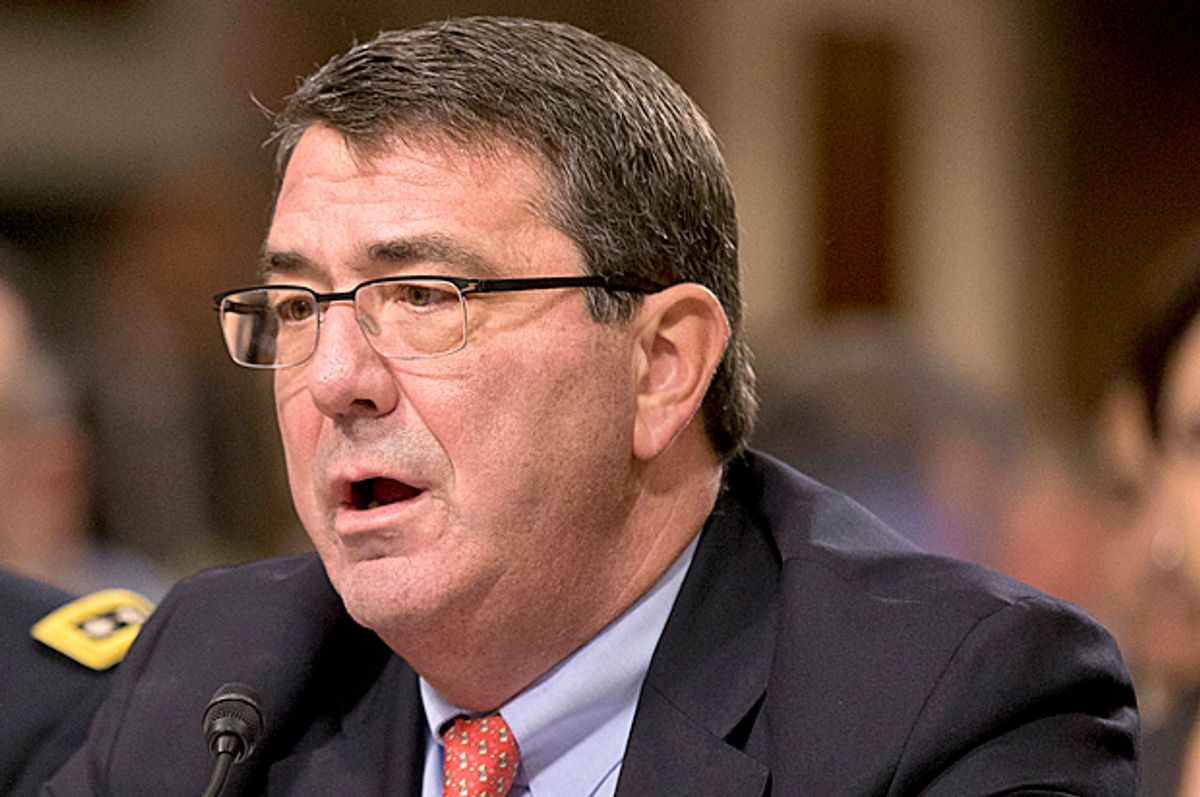Today, President Obama announced that he’s nominating Ashton Carter to be the next Secretary of Defense. Carter has had a long career in national security, including two stints at the Pentagon, and most media profiles of him note that he’s widely respected on the right and probably won’t face too much opposition from Senate Republicans at his nomination hearing.
Part of the reason Republicans are so keen on him is that Carter, the words of the New York Times, “may advocate a stronger use of American power,” which is to say that he’s a fan of blowing things up. He’s especially fond of blowing things up in North Korea, and there’s already been quite a bit of discussion about a 2006 Washington Post Op-Ed he co-authored advocating that the U.S. “immediately make clear its intention to strike and destroy the North Korean Taepodong missile before it can be launched.”
Less remarked upon, however, is this 2003 interview Carter gave to PBS, in which he related how he, as a member of the Defense Department under Bill Clinton, gamed out airstrikes on a North Korean nuclear power plant (and suspected plutonium processing site). Such an attack, Carter said, would risk a broader conflagration on the Korean peninsula which would cost tens of thousands of Korean and American lives, but it would be worth running that risk to halt Korea’s nuclear development.
For the layperson like myself “airstrike on a nuclear plant” sounds like a very problematic idea, what with the Chernobyl-like implications of violently disrupting the normal operations of a nuclear reactor. But Carter was confident that there wouldn’t be a meltdown or fallout… most likely.
CARTER: We looked into the possibility of compelling them by force to set back their nuclear program. We designed a strike of conventional precision munitions on Yongbyon [nuclear plant], which we were very confident would destroy the reactor, entomb the plutonium and that we could mount such a strike and carry it out without causing the reactor to create a Chernobyl-like radiological plume downwind, which was an obviously important concern.
INTERVIEWER: It is a Chernobyl model plant. Correct?
CARTER: It is graphite-moderated like the Chernobyl plant. It's a smaller scale, but it does have flammable graphite in it. So you need to worry that a fire could start that would sweep all this radioactive junk up from the core and cause a radiological problem downwind. We were very confident we could avoid that.
But, Carter elaborated, a little bit of nuclear winter wasn’t the major concern. The biggest thing to worry about was the likelihood that North Korea would respond by mobilizing its huge standing army to attack South Korea, leading to a broader conflict and widespread death and devastation. But, he added, that was a risk worth taking:
CARTER: We reckoned there would be many, many tens of thousands of deaths: American, South Korean, North Korean, combatant, non-combatant. So the outcome wasn't in doubt. But the loss of life in that war -- God forbid that kind of war ever starts on the Korean Peninsula. The loss of life is horrific.
Everyone could appreciate the magnitude of the damage that North Korea could do, if it chose to respond to a strike on Yongbyon [by attacking South Korea]. Now, if we did it properly, if it came to this option, one would say to the North Koreans in advance, "Yes, you can lash out at South Korea after we mount this attack. That will be the end of your regime." So after the strike on Yongbyon, the ball's in their court.
Now what we couldn't do was assure anyone, and I'm sure the secretary of defense couldn't assure the president, that North Korea would not, irrationally lash out and begin that war. They say they would. So we would be calling their bluff. Therefore, there were substantial risks associated with carrying that out that attack, although it would surely set back their nuclear program. That was a risk that I certainly felt at the time, and feel now, was worth running in light of the enormous risks to our security associated with letting North Korea go nuclear.
“It is such a disaster for our security in many ways to allow North Korea to go nuclear,” Carter added, “that we needed to run then – and I think we need to run now – substantial risks to avoid the greater danger of a nuclear North Korea.”

Shares